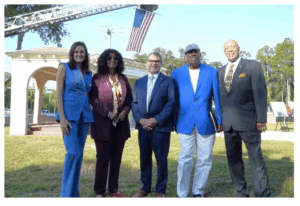ARKASNAS: Event Examines Deadliest Racially-Charged Massacre in Arkansas History
With the start of Black History Month just weeks away, a new event will examine one of the lowest points in the history of race relations in Arkansas.
The Voices of Elaine Symposium will discuss events surrounding the 1919 killing of as many as several hundred Black people in eastern Arkansas, an event now known now as the Elaine Massacre.
Event chair Kristie Rosset says the deadly incident of racially-charged violence is still relatively unknown.
“Those who survived were told, ‘do not talk about it.’ In fact, there was even a newspaper article saying ‘go to work, continue your lives, do not talk about it,’ and [the survivors] needed to pretend like nothing had happened because they were still in fear of their lives or fear of getting their family members killed,” Rosset said.
Between Sept. 30 and Oct. 12, 1919, hundreds of Black men, women and children were killed in the Phillips County community of Elaine. Black sharecroppers, attempting to get a higher, fairer price for their cotton, were attacked at a meeting of the Progressive Farmers and Household Union. That led to days of mob violence on the part of white residents of Elaine and surrounding areas, leading Gov. Charles Hillman Brough to send U.S. troops to round up Black residents suspected of being involved in the massacre.
Rosset says the symposium will feature three descendants of victims of the massacre, some of whom were not aware of the violence for quite some time.
“Even the descendants whose grandparents, some who lived through the massacre and some who died, the descendants didn’t hear about this until well into adulthood. It was even kept from the family members,” Rosset said.
The event will also feature a screening of the documentary “We Have Just Begun – The 1919 Elaine Massacre and Dispossession.” Former Pulaski County Circuit Judge Wendell Griffen will also speak about the case of the “Elaine 12,” survivors of the massacre who were falsely convicted of killing five white people during the violence.
Rosset says she hopes participants leave with a sense of motivation to help correct some of the state’s historical wrongs.
“This event in history should be taught, not to make people feel bad, but it’s our history. And it continues to impact when there are buildings named after the governor who went to kill Black people for trying to earn a fair living, we should be aware of that.”
The symposium is hosted by the Hot Springs chapter of the NAACP and the Elaine Legacy Center. It’s set for 11 a.m. Feb. 4 at the Central Theatre in Hot Springs. More information is available online.
ualrpublicradio.org



